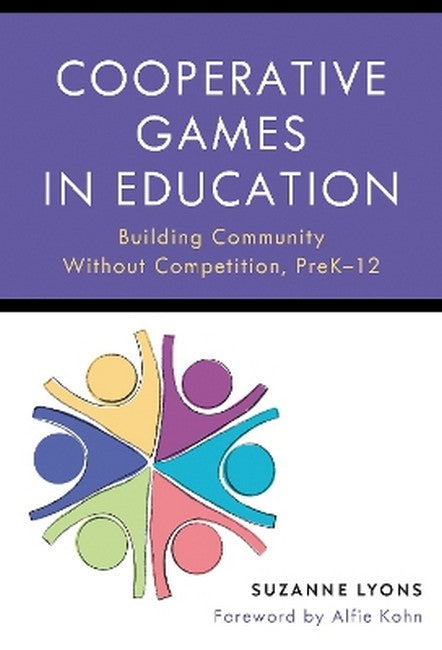Suzanne Lyons is a former physics and general science teacher; co-author of Conceptual Integrated Science, a textbook program used internationally and now in its third edition; a teacher trainer; and an award-wining game designer. Suzanne provides workshops and conference presentations on cooperative games, and she continues to educate the public through her website CooperativeGames.com.
Request Academic Copy
Please copy the ISBN for submitting review copy form
Description
Contents Foreword ix Acknowledgments xiii Introduction 1 About Playing Together 1 Why This Book? 3 Contents of This Book 5 PART I. FOUNDATIONS OF COOPERATIVE GAMES 1. What Are Cooperative Play and Games? 8 Understanding Play 8 Defining Cooperative Games 10 A Brief History of Cooperative Games 10 Theories of Learning and Play Supporting Cooperative Games 12 Playful Learning 16 Meeting Current Challenges in Play with Cooperative Games 17 Chapter Summary 21 Play to Learn-Try This! 22 2. Learning to Cooperate 24 Understanding Cooperation 25 Forms of Cooperation 26 What Cooperation Is Not 27 Roots of Cooperation 28 Social Interdependence Theory: Cooperation versus Competition 30 Learning Cooperation in School 32 Teaching Cooperation Through Play and Games 33 What Research Says About Teaching Cooperation Through Games 35 Chapter Summary 36 Play to Learn-Try This! 37 3. Rethinking Competition 39 Defining Terms 40 Documented Downsides of Competition 42 Handling Competition With Care in the Classroom 48 Chapter Summary 49 Play to Learn-Try This! 50 PART II. SOME COOPERATIVE GAMES AND GUIDELINES FOR PRACTICE 4. A Gallery of Cooperative Games 52 Cooperative Games for Welcoming and Inclusion 53 Cooperative Games for Trust-Building and Empathy 55 Cooperative Games for Community-Building 56 Cooperative Games to Prevent Bullying 57 Cooperative Games for Young Children 59 Cooperative Games for Older Children, Tweens, and Teens 61 Cooperative Games to Teach Language Arts 62 Cooperative Games to Teach Math 63 Cooperative Games to Teach Science 64 Classic Cooperative Play Activities 66 Chapter Summary 66 Play to Learn-Try This! 67 5. A Guide to Facilitating Cooperative Games 68 The Five Steps of Facilitating Games 69 Designing Cooperative Games 75 Converting Competitive Games to Cooperative Games 78 Chapter Summary 79 Play to Learn-Try This! 79 PART III. APPLICATIONS OF COOPERATIVE GAMES 6. Cooperative Games to Support Cooperative Learning 82 Background on Cooperative Learning 83 Using Cooperative Games to Support Cooperative Learning 85 A Cooperative Games Training Program for Cooperative Learning 86 Chapter Summary 91 Play to Learn-Try This! 91 7. Cooperative Games and the "Soft Skills" 93 Teaching the Whole Student 93 Pedagogy of Cooperative Games for Social and Emotional Learning 94 Cooperative Games and Classroom Climate 98 Cooperative Games for Moral Education 100 Chapter Summary 101 Play to Learn-Try This! 102 8. Cooperative Games to Prevent Aggression 103 The Aggressive Student 103 Group Aggression: Fighting Together 105 Treating Group Aggression 110 Cooperative Games to Reduce Group Aggression at School 112 Chapter Summary 116 Play to Learn-Try This! 117 9. Cooperative Games in Early Childhood Education 119 Young Children and Play 120 Cooperative Play-The Capstone of Early Childhood Social Development 122 How Cooperative Play Promotes Social Development 123 Two Definitions of Cooperative Play 125 Summary of Important Differences Between Competitive and Cooperative Play 126 How to Use Cooperative Games in the Early Childhood Classroom 128 Chapter Summary 133 Play to Learn-Try This! 134 Epilogue: Putting It All Together: A Pedagogy of Cooperative Games 136 Elements of the Pedagogical Framework 136 Conclusion 139 Appendix A. Answers to Questions for Reflection 141 Appendix B. Resources for Further Exploration 145 References 147 Index 154 About the Author 161
"Ultimately, this book is most insightful for teachers, educators and researchers to reflect and realise the possible abuses of fossilised cooperative learning practices in our educational field and change them into more 'peaceful' and 'humanist' paradigms." -Journal of Education for Teaching

